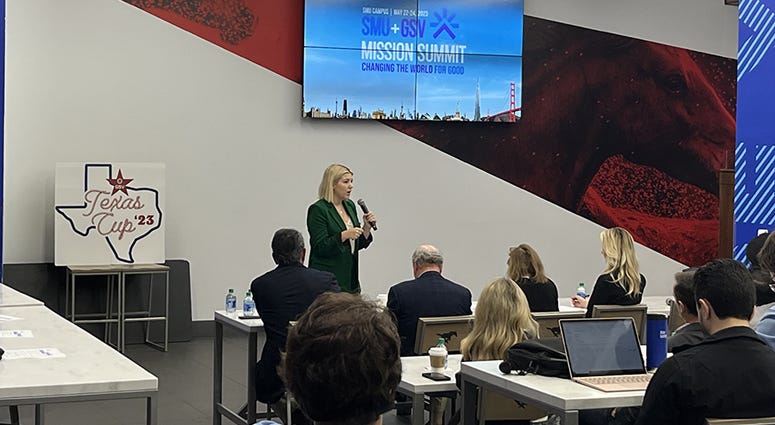
Students at 13 colleges and universities in Texas are pitching business ideas this week to business leaders gathered at SMU. SMU and the venture capital firm, Global Silicon Valley, launched "Texas Cup '23."
Organizers describe the event as a "capitalism refresh" where students can pitch ideas that would turn a profit while also improving society.
"When you look at this generation of entrepreneurs, many of them are motivated by ideas that can have a positive impact on society," says GSV Founder Michael Moe. "Not just, 'How do I make money?' but 'How can I help solve a problem?' or, 'How can I make the world a better place?' We call it changing the world for good."
Students are competing from 13 colleges and universities: Dallas College, Dallas Baptist University, Paul Quinn College, Southern Methodist University, Tarrant County CollegeTexas A&M Commerce. Texas Christian University, Texas Women’s University, University of Dallas, University of North Texas - Dallas, University of Texas at Arlington, University of Texas at Dallas, UT Southwestern
SMU Student Morganne Stewart founded Helixx Medical. She says a family member has a genetic disorder, but they could not find a secure item that could provide medical information quickly.
Stewart says she is designing bracelets that would give paramedics and first responders more information about a patient's medical background in an emergency. She says the bracelet could provide downloadable information to let paramedics know about conditions, allergies or medical history.
"I don't know about you, but I couldn't form a sentence in a car accident, so if I could give that first responder that opportunity to get that information faster, it saves lives," she says.
Stewart told the panel she has talked to Parkland Hospital and Dallas Fire Rescue about the idea. Asked what price point she was considering for the bracelets, she said she expected them to start at $34, but she would consider more expensive styles for people who wanted them.
Panelists asked her how she would distribute the app or software among different departments and how she would ensure first responders know the bracelet is not just a piece of jewelry.
"In another pitch competition we did, we really changed out to have more of that customer service to make sure our team is equipped to give that information to a first responder," she says.
Long-term, Stewart says Helixx could look at options to use RFID tags to maintain hospital records through the course of a stay.
"This is really a venture for helping us grow as a community and helping us be better humans," she says.
Ben Sam Daniel, a student at Dallas Baptist University, designed "Vestate," which would use virtual reality to give potential buyers a more detailed look at a home.
"Technology is advancing insanely fast," he says. "Bringing virtual reality into one of the booming industries like real estate, especially in Texas, can really help all sides involved in a transaction."
With many people moving to Texas from other states like California, Daniel says Vestate can give potential buyers a more detailed look at a property without traveling hundreds of miles.
"Right now, we normally look at a picture and say, 'This house looks really good. I want to see some videos,'" he says.
Daniel says people can now look at 360-degree videos from their phone, tablet or laptop, but he says his company would allow people to immerse themselves in the property like they could during an open house.
"You'll have more ownership of knowing how the house is, and you'll have a better feel for it and be sure this is what you want," he says.
He says Vestate would also let people who own open property see how a house would look with different elements before starting construction.
"You can start laying the foundation and start building the house, or it could be an existing house you want to remodel," Daniel says.
He says he would like to expand the idea to work with other companies so people could place furniture and other decorations in a VR home before they buy.
"Where I'd like to take this further is you could choose furniture from markets like Ikea or Home Depot. You could integrate that market with e-commerce," he says, saying VR could also be used to develop ideas to renovate a room in a home you already own.
Moe, the founder of GSV, says many ideas come from a need someone has recognized in their own life.
"Oftentimes, you see an entrepreneur start an idea because of a problem they had or a situation they face and think, 'Gosh, if there only were a better way to do this,'" he says.
This is the first year for the summit at SMU, but Moe says they plan to host it annually. He says the event can foster relationships that can help develop business leaders who will look toward the future and build stronger communities.
Winning concepts were "StoryIt", Racquet Armor and Immoscope.
GSV is working with Hoque Global, which has a mission "to create impact with real estate development and investment.
More information about the SMU+GSV Mission Summit is available at www.smugsvsummit.com/ .
LISTEN on the Audacy App
Tell your Smart Speaker to “PLAY 1080 KRLD”
Sign Up and Follow NewsRadio 1080 KRLD
Facebook | Twitter | Instagram

